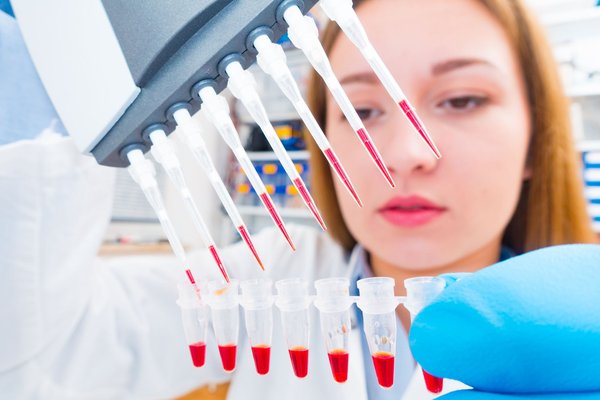Despite significant progress, cancer continues to be a big problem. Over 1.9 million new cases of cancer are likely to be diagnosed in the U.S. alone this year. More than 600,000 deaths are expected from cancer in 2022.
There's also a huge financial cost that's growing rapidly. In 2018, the top 15 types of cancer cost the U.S. more than $156 billion, according to researchers at Penn State College of Medicine. The National Cancer Institute projects that cancer-related medical costs will soar to $246 billion by the end of this decade.
But with every problem comes an opportunity -- in this case, a massive opportunity. Both large and small companies are developing new ways of diagnosing and treating cancer. Here's what you need to know about some of the leading cancer-focused healthcare stocks that investors should consider in 2022.

Top cancer stocks
There are a lot of small drugmakers that focus on cancer therapies, but many investors don't like the high levels of volatility and risk associated with early-stage biotech stocks. However, below are four cancer stocks that shouldn't be nearly as risky as the smaller players.
| Company | Market Cap | Key Areas of Focus |
|---|---|---|
| Bristol Myers Squibb (NYSE:BMY) | $137 billion | Oncology, immunology, cardiovascular diseases |
| Guardant Health (NASDAQ:GH) | $7 billion | Liquid biopsy |
| Illumina (NASDAQ:ILMN) | $54 billion | Genomic sequencing, liquid biopsy |
| Pfizer (NYSE:PFE) | $293 billion | Oncology, immunology, cardiovascular diseases, rare diseases, vaccines |
Bristol Myers Squibb
Bristol Myers Squibb (NYSE:BMY) currently markets six cancer drugs that each generate sales of at least $1 billion per year. The company's top-selling product is Revlimid, which is the No. 1 prescribed drug for multiple myeloma. Revlimid is also approved to treat several other types of blood cancer.
Cancer immunotherapy Opdivo ranks third in Bristol Myers Squibb's lineup based on revenue. The drug is expected to achieve peak sales of $11.75 billion by 2026, roughly 60% higher than the current level of sales.
Bristol Myers Squibb faces limited-volume generic competition for Revlimid beginning this year. However, the company has plenty of rising stars that should help offset declining sales for its top drug, including newer cancer drugs Abecma and Breyanzi, that could become blockbusters.
The big drugmaker's pipeline also features several promising programs. Multiple late-stage studies of Opdivo in combination with other cancer drugs are underway. Bristol Myers Squibb is evaluating an array of other experimental cancer drugs targeting blood cancer and solid tumors in phase 2 clinical studies.
But oncology isn't the company's only area of focus. Bristol Myers Squibb is also a leader in cardiovascular disease with its blood thinner Eliquis and in immunology with Orencia and Zeposia.
Guardant Health
Guardant Health (NASDAQ:GH) stands out as a pioneer in liquid biopsy. What is liquid biopsy? It's a test that detects tiny amounts of DNA in the blood that has broken off of tumor cells.
The company first achieved success with its Guardant360 product, a liquid biopsy used to help determine the appropriate therapy for cancer patients. The Guardant360 CDx product is the first liquid biopsy approved by the U.S. Food and Drug Administration (FDA) for all advanced solid tumors. It's also used as a companion diagnostic to identify patients with non-small cell lung cancer who could potentially benefit from treatment with AstraZeneca's (NASDAQ:AZN) Tagrisso, Johnson & Johnson's (NYSE:JNJ) Rybrevant, or Amgen's (NASDAQ:AMGN) Lumakras.
Guardant Health also offers a tissue biopsy product, Guardant360 TissueNext, designed to be ordered alongside the Guardant360 CDx test. Its Guardant360 Response test helps doctors determine if a cancer therapy is working with patients. In addition, Guardant Health markets Guardant Reveal, the first blood-only test that can detect residual and recurrent cancer in less than two weeks without requiring tissue biopsy.
The company's total addressable market in cancer treatment selection and recurrence monitoring is around $30 billion per year. But Guardant Health has a much larger opportunity-- more than $50 billion annually -- in detecting cancer at early stages.
On this front, 2022 should be a critical year for the company. Guardant Health hopes to file for premarket approval of its LUNAR-2 blood test for the early detection of colorectal cancer later this year, pending positive clinical results. That will likely be only the beginning, though. The company plans to expand its capabilities to detect other types of early stage cancer, including lung, pancreatic, bladder, and liver cancer.
Illumina
Guardant Health isn't the only player in liquid biopsy. Gene-sequencing giant Illumina (NASDAQ:ILMN) completed the acquisition of its former spinoff, Grail, in 2021. Grail already offers Galleri, a liquid biopsy that can be used in the early detection of more than 50 types of cancer.
Illumina also is a major competitor in the cancer therapy selection market. Its TruSight companion diagnostic tests are used by 11 partners, including Bristol Myers Squibb and Merck (NYSE:MRK).
Arguably the greatest value provided by Illumina in the fight against cancer, though, is that its gene-sequencing systems are used by researchers across the world. More than 20,000 Illumina systems are installed, with the highest number of instrument placements ever last year.
Of course, genomic sequencing isn't just important in cancer research. Illumina's technology is used in a wide range of areas, including researching genetic and infectious diseases, non-invasive prenatal testing, drug discovery, and proteomics (the large-scale study of proteins).
Illumina could have several catalysts on the way. These include launches this year of its DRAGEN 3.1 product for next-generation sequencing data analysis and of early access to its new long-read sequencing technology that offers 10 times the throughput of other long-read systems with 90% less DNA input.
Related Investing Topics
Pfizer
Pfizer (NYSE:PFE) currently markets three blockbuster oncology therapies -- breast cancer drug Ibrance, prostate cancer drug Xtandi, and kidney cancer drug Inlyta. The company also has a dozen other cancer drugs that generate annual sales of at least $100 million.
Cancer is also the top area of focus for Pfizer's pipeline. The drugmaker has around 30 oncology programs in clinical testing. While several of these programs are targeting additional indications for already approved drugs, Pfizer also has promising new candidates, including experimental multiple myeloma drug Elranatamab.
The pharma giant has also put its large cash stockpile to use in key acquisitions that bolster its oncology prospects. For example, Pfizer acquired Trillium Therapeutics in 2021 to gain its blood cancer programs.
Pfizer's recent success has been fueled primarily by its COVID-19 vaccine Comirnaty. The company should rake in billions of dollars in sales in 2022 as vaccination efforts continue. It also is poised to make tremendous profits with its new COVID-19 pill, Paxlovid.
In addition, Pfizer has other vaccines that hold the potential to be huge moneymakers. In particular, Prevnar 20 seems likely to extend Pfizer's dominance in the pneumococcal vaccine market, and experimental respiratory syncytial virus vaccine candidate PF-06928316 could be a big winner.

















